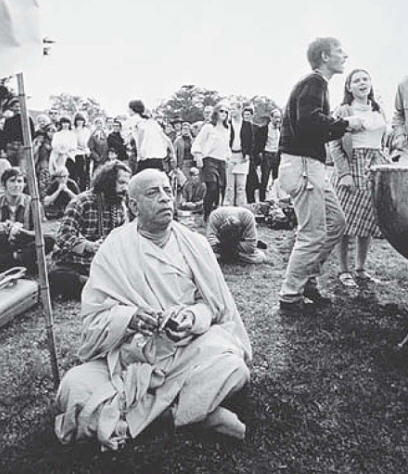An early ISKCON devotee recalls how a Hindi movie
song popularized the Hare Krishna mantra.
After the Delhi pandal program in 1971, Srila Prabhupada got an invitation to go to Madras. But he was planning to go to Vrindavana, taking his disciples there for the first time. Still, he wanted someone to go to Madras. No one wanted to go; everyone wanted to go with Prabhupada to Vrindavana. Somehow I had the idea that the secret of success in Krishna consciousness was to follow the order of the spiritual master and please him, so I volunteered. In Madras I was alone for much of the time. I kept asking for help, but it was hard to get devotees.
THE NEW MOVIE SONG
While I was in Madras a song came out. In Srila Prabhupada’s purports he sometimes mentions cinema songs, which are the most popular in India. The refrain of this song was “Dam maro dam . . . Hare Krishna Hare Rama, Hare Krishna Hare Rama, Hare Krishna Hare Rama.” We didn’t have a center in Madras then; I was just staying with different people. Because I kept hearing the song I finally asked my host what the translation was. I don’t know if he misunderstood the actual meaning or was just being polite, but he said, “With every breath I take, Hare Krishna, Hare Rama” which sounded very nice. So for a while we were in the illusion that that was what the song meant. Eventually we found out what it really meant: “With every puff that I take, Hare Krishna Hare Rama.”
ISKCON MISREPRESENTED

From Madras we went to Calcutta, and there the movie that featured this song was playing. We didn’t really know what the movie was, but in those days in America whenever the musical or the movie Hair would show, devotees would do harinama sankirtana in front of the theater and distribute books, because Hair featured a song with the full Hare Krishna maha mantra. We thought, “Oh, the movie Hare Rama Hare Krishna will be a great opportunity,” so we had harinama and distributed books outside the theater. But when most of the customers had entered the theater I thought, “Let me steal a peek. Let me see what this movie is.” I went inside just as it was about to begin. It was very impressive on a big screen, with loud amplifiers. The film began with shots of the ocean the waves of the ocean on the shore. The narrator, with a deep, resonant voice, intoned, “For centuries India’s spiritual culture remained within the shores of India, but one man . . .” then it showed a picture of Srila Prabhupada “took India’s spiritual culture across the ocean.” Then it showed the London Ratha yatra, so dramatic on the big screen, and I thought, “Wow! This is amazing!” And then it showed a bunch of hippies smoking ganja and hashish and chanting Hare Krishna, Hare Rama. They were dressed just like hippies, with boys and girls mixing. It was really bad the theme of the movie was that Srila Prabhupada was degrading the sacred Indian culture by giving it to hippies who were just misusing it, chanting Hare Krishna, Hare Rama and smoking dope and indulging in free sex and everything else.
That was a blow. Later, Srila Prabhupada said the government was behind the film because they were afraid our movement would become too popular, and they wanted to turn people away from it. Yet Srila Prabhupada had such faith in the holy name that he said, “In the long run, the film will actually help us, because eventually people will forget the dam maro dam and just remember the Hare Krishna, Hare Rama.” And it came true. From Calcutta I went to Bombay, and especially the street urchins there so many street urchins stand at corners and beg or sell magazines whenever they saw us they would gather around us and put their hands to their mouths, as if they were smoking chillums with charas (hashish), and sing in a mocking way, “Dam maro dam, dam maro dam . . .” Most of the time they wouldn’t even get to the “Hare Krishna, Hare Rama” just “Dam maro dam.” It was like a plague. Wherever we went these little kids would surround us and taunt us: “Dam maro dam.”
It went on like that for some time and it was difficult. Then after maybe a year of the song playing it was extraordinarily popular the emphasis shifted. The two parts the dam maro dam and the Hare Krishna, Hare Rama became equal. And eventually, just as Prabhupada had predicted, the dam maro dam dropped out altogether. It was a mundane sound vibration and had no real attraction. But the Hare Krishna, Hare Rama was transcendental and ever fresh. After the dam maro dam dropped out, when people saw us they would simply smile and say, “Hare Krishna, Hare Rama.” That came to pass.
